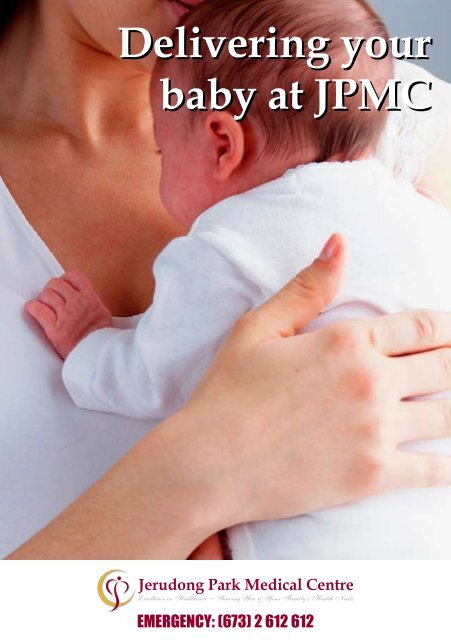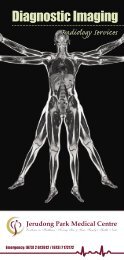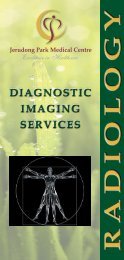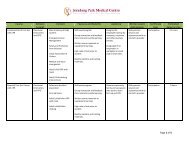Delivering your baby at JPMC Delivering your baby at JPMC
Delivering your baby at JPMC Delivering your baby at JPMC
Delivering your baby at JPMC Delivering your baby at JPMC
Create successful ePaper yourself
Turn your PDF publications into a flip-book with our unique Google optimized e-Paper software.
<strong>Delivering</strong> <strong>your</strong><strong>baby</strong> <strong>at</strong> <strong>JPMC</strong>EMERGENCY: (673) 2 612 612
Congr<strong>at</strong>ul<strong>at</strong>ions on <strong>your</strong> pregnancy and thank you for choosing <strong>JPMC</strong> to look after <strong>your</strong>m<strong>at</strong>ernity needs. At <strong>JPMC</strong> M<strong>at</strong>ernity Ward, we assure you a pleasant stay through <strong>your</strong>labour with tender loving care from our team of obstetricians and midwives. Please feel freeto ask the midwives for any assistance during <strong>your</strong> stay with us.At <strong>JPMC</strong> M<strong>at</strong>ernity Ward, we want you to feel <strong>at</strong> home.Wh<strong>at</strong> To Bring To Jpmc For Your AdmissionUpon admission, you will be given an admission pouch, which contains basis amenities, anda pair of bedroom slippers, but we recommend th<strong>at</strong> you also bring <strong>your</strong> own personal items:Personal ToiletriesNursing Bra and Undergarments (we provide 4 pieces pf disposable panties for 2-nightstay, 6 pieces for 4-night stay)Breast PadsM<strong>at</strong>ernity Pads (we provide 10 pieces for 2-night stay, 15 pieces for 4-night stay)Reading m<strong>at</strong>erials (books, magazines, personal stereo, etc.)Unrestricted clothing for departure from <strong>JPMC</strong>NB: It is advisable to leave valuable items and large sums of money <strong>at</strong> home.During Your StayDaily Routine In keeping with our motto. “Excellence in Healthcare”, a midwife will <strong>at</strong>tend to all <strong>your</strong>needs and closely monitoring <strong>your</strong> progress throughout <strong>your</strong> stay. The doctors will visit you in the morning & evening, and can be contacted <strong>at</strong> any othertimes when the needs arises. Asian and Western meals (breakfast, lunch, high tea and dinner) are served daily. Extrameals can be purchased from the cafeteria (Level 1), <strong>at</strong> <strong>your</strong> own expense. Your room will be maintained daily by our housekeeping services.VisitorsAlthough visitors are allowed, it is advisable not to have too many people (more than three)visiting <strong>your</strong> room <strong>at</strong> any one time. Remember th<strong>at</strong> you have just given birth and will feelquite tired, as well as tiring easily. If you have had a Caesarian delivery, we strongly adviseyou not to have visitors on the first day, except for <strong>your</strong> spouse. Your <strong>baby</strong> also needs to beprotected from risk of infection. Any visitor wishing to hold <strong>your</strong> <strong>baby</strong> should wash his/herhands first.There is a limited waiting area just outside the Obstetric Unit, but waiting in the corridors isnot allowed, due to regul<strong>at</strong>ions concerning restricted access.Smoking is not allowed within the hospital.There is a telephone for each bed; you can inform <strong>your</strong> rel<strong>at</strong>ives and friends of the direct line.Mobile telephones are not allowed to be used in the labour room as they may interfere withvital equipment, but you can use a mobile in <strong>your</strong> room after delivery.1 • <strong>Delivering</strong> Your Baby Women’s Centre
SecuritySecurity personnel constantly p<strong>at</strong>rol <strong>JPMC</strong> within the Obstetric Unit. Close circuitsurveillance televisions, inventory alarm circuits on all access points and electronic securitydoors provide added security <strong>at</strong> all times.NB: After 21:00 hours the Obstetric Unit doors are locked. For security reasons, visitorsother than <strong>your</strong> partner are not allowed after this time.Language Interpret<strong>at</strong>ion<strong>JPMC</strong> Midwives and nurses have a range of language capabilities including English, Malay,Mandarin and some Chinese dialects. If you or <strong>your</strong> family are more comfortable with otherlanguages, please ask for assistance and we will do our best to accommod<strong>at</strong>e.Registr<strong>at</strong>ion Of Your Baby<strong>JPMC</strong> will complete the necessary documents required by law to register <strong>your</strong> <strong>baby</strong>; thesemust be submitted within two weeks. You may have to provide the following:Copies of both Husband and Wife’s Identific<strong>at</strong>ion CardsCopy of Marriage Certific<strong>at</strong>eThese will be issued on the day of <strong>your</strong> discharge or earlier (if needed).You will also receive the following documents on discharge:Take-home medicine prescriptionVaccin<strong>at</strong>ion recordsFollow-up appointments for both you and <strong>your</strong> <strong>baby</strong>Relevant inform<strong>at</strong>ion leaflets, such as contraception advice & <strong>baby</strong> vaccin<strong>at</strong>ionleaflets, etc.The loc<strong>at</strong>ions of Health Care Clinics in BruneiPregnancy and Discharge SummaryM<strong>at</strong>ernity Leave Certific<strong>at</strong>e (if required)NB: All care incorpor<strong>at</strong>ed in our packages and billing prices are upd<strong>at</strong>ed on a regularbasis.For <strong>your</strong> BabyWe provide the following during <strong>your</strong> stay, but we also recommend th<strong>at</strong> you bring <strong>your</strong>own: Disposable diapers (10 pieces for 2-night stay, 15 pieces for 4-night stay) Cotton Wool Baby Wipes (1 packet) Baby Toiletries Baby Clothes. You may wish to use <strong>your</strong> <strong>baby</strong>’s own clothes (a laundry service for this isnot available). <strong>JPMC</strong> is a <strong>baby</strong>-friendly hospital and we strongly recommend breast feeding and wewill assist you with breastfeeding, as you need. In the event of medical or personalreasons, where you wish to bottle feed <strong>your</strong> <strong>baby</strong>, we provide ready-made milk formula.However, should you wish to choose a specific formula, please provide <strong>your</strong> own milkpowder. Bottles and sterilising equipment are available.<strong>Delivering</strong> Your Baby Women’s Centre• 2
NB: The making up of infant feeds in rooms is not allowed, due to safetyconstraints. Your midwife will make up feeds for you, and will also demonstr<strong>at</strong>ehow to do this.Electronic and hand breast pumps are available for use in the ward, but you may like tobring <strong>your</strong> personal one.To take <strong>your</strong> <strong>baby</strong> home, you will need <strong>baby</strong>’s own clothes, a wrap/blanket, and anapproved car safety se<strong>at</strong>. A midwife will escort you to <strong>your</strong> car to ensure th<strong>at</strong> both motherand <strong>baby</strong> travel safely.We hope the inform<strong>at</strong>ion provided to you will assistyou during <strong>your</strong> pregnancy. Should you have anyfurther queries, please do not hesit<strong>at</strong>e to consult <strong>your</strong>Obstetrician or midwives <strong>at</strong> <strong>JPMC</strong> M<strong>at</strong>ernity Ward.We wish you a pleasant journey towards Motherhood!Early Signs Of LabourShow :This is a plug of mucous in the cervix, which helps to seal the wombduring pregnancy. Sometimes it comes away either before labour or earlyin labour. However, it is not a strong indic<strong>at</strong>ion of labour. It is sticky, whiteor pink mixed with mucous and it should not be fresh bleeding. If youexperience a lot of bleeding, you must contact the hospital.W<strong>at</strong>er Breaking :The bag of w<strong>at</strong>er in which the <strong>baby</strong> is flo<strong>at</strong>ing may break beforelabour starts. If the w<strong>at</strong>ers break before labour starts, you will noticeeither a slow trickle from <strong>your</strong> vagina or a sudden gush of w<strong>at</strong>er th<strong>at</strong>you cannot control. In this case, ring up the hospital and come in.Strong Regular Contractions :Initially, the contractions are irregular, but once they become regular and stronger, ring upthe labour ward and come in.Other insignificant signs are nausea or vomiting and diarrheoa.Please note if labour starts early.Sometimes labour starts early, even as early as 24 weeks. If this happens, get adviceimmedi<strong>at</strong>ely from the hospital.Preparing for LabourIt is helpful to <strong>at</strong>tend anten<strong>at</strong>al classes run by midwives who know about the hospital whereyou are booked. They can teach you about pregnancy and labour and caring for <strong>your</strong> <strong>baby</strong>.They will tell you wh<strong>at</strong> to expect when you go into hospital, wh<strong>at</strong> procedures may be needed3• <strong>Delivering</strong> Your Baby Women’s Centre
and the reasons for them. Understanding wh<strong>at</strong> may happen during labour will make you feelless anxious. It is also a good plan to visit the hospital where you plan to have <strong>your</strong> <strong>baby</strong>. Allthis will help you to relax and cope better.During pregnancy, midwives can teach you bre<strong>at</strong>hing exercises, relax<strong>at</strong>ion and goodposture to help <strong>your</strong> back.At the classes, you can also learn about the types of pain relief th<strong>at</strong> are in use. Ask to see ananesthetist if you want further advice about certain types of pain relief and whether they maybe suitable for you. Anesthetists are doctors who provide epidurals, and who can also adviseyou about other types of pain relief.Pain Relief During LabourWh<strong>at</strong> will labour feel like?Towards the end of pregnancy, you may notice <strong>your</strong> uterus tightening from time to time(Braxton Hicks). When labour starts, the tightening will become more regular and muchstronger. This may cause pain th<strong>at</strong> <strong>at</strong> first feels like strong period pain, but usually it getsmore severe as labour progresses. The amount of pain varies. Your first labour is usually thelongest and hardest. Sometimes it is necessary to start labour artificially or to stimul<strong>at</strong>e it ifprogress is slow, and this may make it more painful. Over 90% of women find they need somesort of pain relief.Wh<strong>at</strong> methods of pain relief are available?There are several ways of helping you cope with pain. It is difficult for you to knowbeforehand wh<strong>at</strong> sort of pain relief will be best for you. The midwife who is with you in labouris the best person to advise you. Here are some of the facts about the main methods of painrelief th<strong>at</strong> you may be offered.Simple MethodsPain in early labour can often be managed by simplemethods. A supportive companion is invaluable.Relax<strong>at</strong>ion is important and moving around sometimeshelps. The types of pain relief available in <strong>JPMC</strong>M<strong>at</strong>ernity Ward are:Transcutaneous Electrical Nerve Stimul<strong>at</strong>ion (TENS) A gentle electrical current is passed through two / four fl<strong>at</strong> pads stuck to<strong>your</strong> back. This cre<strong>at</strong>es a tingling feeling. You can control the strength ofthe current <strong>your</strong>self. It is sometimes helpful <strong>at</strong> the beginning of labour, particularly forbackache. If you hire one, you can start it <strong>at</strong> home. It has no known harmful effects on <strong>your</strong> <strong>baby</strong>. It is unusual for this to be the only method of pain relief you wouldneed.<strong>Delivering</strong> Your Baby Women’s Centre• 4
Entonox (50% nitrous oxide and 50% oxygen) You bre<strong>at</strong>he this through a mask or a mouthpiece. It is simple and quick to act, and wears off in minutes. It sometines makes you feel light-headed or a little sick for a short time. It does not harm <strong>your</strong> <strong>baby</strong>. It does not take the pain away completely but it helps to ease it a little. It can be used <strong>at</strong> any time during labour.You, <strong>your</strong>self, can control the amount of gas you use, but timingis important. You should start bre<strong>at</strong>hing the gas as soon as youfeel a contraction coming so th<strong>at</strong> you can get the full effect whenthe pain is <strong>at</strong> its worst. You should not use it betweencontractions or for long periods as this can make you feel dizzyand tingly. Also, bre<strong>at</strong>hing very hard is not very good for <strong>your</strong><strong>baby</strong>. In some hospitals, other substances may be added to thegas to make it more effective, but these may make you sleepier.Pethidine An injection available for pain relief (it can be given up to two doses). It makes you drowsy, but may make you less worried by the pain and helps you torelax. It can make you feel sick, but you should be given something else to reduce this effect. It can make <strong>your</strong> <strong>baby</strong> drowsy, but an antidote can be given. If pethidine isgiven only shortly before delivery, the effect on <strong>your</strong> <strong>baby</strong> is very slight. It has less effect on pain than gas.Though pethidine has a limited effect on pain, some mothers find it makes them more relaxedand able to cope better with the pain. Others, however, find it disappointing. It is usuallygiven as an injection into a muscle by midwives, or it can be given directly into a vein forquick effect, and some hospitals use a machine (called a P<strong>at</strong>ient Controlled Analgesia, PCA),which allows you to press a button to give <strong>your</strong>self measured small doses. It can also be givenin conjunction with an antiemetic should you feel nause<strong>at</strong>ed in labour.Other injected drugsIn some hospitals, other drugs, such as diamorphine or meptazinol, may be used asaltern<strong>at</strong>ives to pethidine. They act in a similar way.EpiduralsGiven into a very small tube in <strong>your</strong> back (back bone).Performed by an Anaesthetist.Little effect on <strong>your</strong> <strong>baby</strong>.Small risk of headache.May cause a brief drop in blood pressure.Most effective method of pain relief.5 • <strong>Delivering</strong> Your Baby Women’s Centre
Who should have an epidural?Most people can have an epidural, but certain complic<strong>at</strong>ions of pregnancy and bleedingdisorders may make it unsuitable. If you have a complic<strong>at</strong>ed or long labour, the obstetricianmay recommend th<strong>at</strong> you have one. In such circumstances, it will benefit both you and <strong>your</strong><strong>baby</strong>.Wh<strong>at</strong> does it involve?You will first need a drip to hydr<strong>at</strong>e you. You will be asked to curl upon <strong>your</strong> side or sit bending forwards. Your back will be cleaned and alittle injection of local anaesthetic given into the skin, so putting in theepidural should not hurt. A small tube is put into <strong>your</strong> back near thenerves carrying pain from the uterus.Once the tube is in place, pain-relieving drugs can be given as often asis necessary, or continuously by a pump. While the epidural is takingeffect, the midwife will take <strong>your</strong> blood pressure regularly. Theanaesthetist and <strong>your</strong> midwife will also check th<strong>at</strong> the epidural isworking properly.Wh<strong>at</strong> are the effects?An epidural should not make you feel drowsy or sick, nor does it normally delaystomach emptying.Occasionally, it drops <strong>your</strong> blood pressure, which is why you have the drip.It sometimes makes you shivery <strong>at</strong> first, but this usually stops quite soon.It may prolong the second stage of labour and reduce the urge to bear down, butwith time, the uterus should push the <strong>baby</strong> out. You are more likely to have a normaldelivery.It removes much of the stress of labour, which is good for the <strong>baby</strong>. In this country as a whole, there is about a one in 100 chance of you getting a badheadache after an epidural, but hospitals vary in their headache r<strong>at</strong>e so you mightenquire about this. If you develop a headache afterwards, it can be tre<strong>at</strong>ed.Backache is common during pregnancy and often continues afterwards when youare looking after <strong>your</strong> <strong>baby</strong>. There is now good evidence th<strong>at</strong> epidurals do not causelong-term backache, though you may feel local tenderness for a day or twoafterwards.Wh<strong>at</strong> if you need an oper<strong>at</strong>ion?If you should need any oper<strong>at</strong>ion such as caesarian section or forceps delivery, you may notneed a general anaesthetic, as the epidural can often be used instead. This is safer for you andthe <strong>baby</strong>.Wh<strong>at</strong> about spinal?Epidurals are r<strong>at</strong>her slow to act, particularly in l<strong>at</strong>e labour. If the pain-killing drugs areput directly into the bag of fluid surrounding the nerves in <strong>your</strong> back, they work muchfaster. This is called a spinal. In some hospitals, spinals, or a combin<strong>at</strong>ion of spinalsand epidurals, are used for pain relief in labour, and spinal anaesthesia is often used forelective caesarian section.<strong>Delivering</strong> Your Baby Women’s Centre• 6
Ou r Se r v i c e sANAESTHESIOLOGY & INTENSIVE CARE▪ Perioper<strong>at</strong>ive Care ▪ Post-Oper<strong>at</strong>ive Care & Pain Relief ▪ Labour Pain Relief ▪ Intensive Care Medicine▪ Anesthesia for Sleep/Paedi<strong>at</strong>ric Dentistry, MRI/ICT Procedures & Day Care SurgeryDENTALProsthodontics ▪ Endodontics ▪ Orthodontics ▪ Implantology ▪ Periodontics ▪ Oral Surgery▪ Professional Teeth Whitening ▪ General Dental ProceduresDIAGNOSTIC IMAGING▪ MRI (1.5 Tesla) with Cardiac MRI, MR Angiography, Spectroscopy, MR Mammography, Stroke Imaging▪ Multi Slice CT Scanner (64 Slice) with Cardiac CT, Coronary CT, CT Whole Body Angiography, pQCT▪ Digital Dental CT (Cone Beam CT) - Digital OPG, CEPH ▪ CR Radiography (X-ray)▪ Digital Flouroscopy ▪ Ultrasound ▪ CR MammographyDIETETIC SERVICES▪ Nutrition & Dietary Counselling ▪ Individualised Diet PlanFITNESS CENTRE▪ Gym ▪ Swimming Pool ▪ Jacuzzi ▪ Sauna B<strong>at</strong>h ▪ AerobicsGENERAL OUTPATIENT▪ General & Pre-Employment Health Screening ▪ VISA Medical Examin<strong>at</strong>ion▪ Adult Vaccin<strong>at</strong>ion ▪ Acute & Chronic Medical ConditionsLABORATORY▪ Biochemistry ▪ Haem<strong>at</strong>ology ▪ Serology ▪ Immunology ▪ Microbiology ▪ Blood Banking & Don<strong>at</strong>ion Services▪ IUI Procedure ▪ Semen Freezing & Semen AnalysisNURSING▪ Adult & Paedi<strong>at</strong>ric Medical Surgical Services ▪ Antenal Educ<strong>at</strong>ion ▪ Midwifery Services▪ Women and Child Health Advisory Services ▪ NICUOBSTETRICS & GYNAECOLOGY▪ Well Women Check-up ▪ Anten<strong>at</strong>al Classes ▪ Anten<strong>at</strong>al & Postn<strong>at</strong>al Clinic▪ Laparoscopic & Hysteroscopic Surgeries ▪ ColposcopyORTHOPAEDICS▪ Surgical & Non-Surgical Tre<strong>at</strong>ment ▪ General Orthopaedics ▪ Sports Injury ▪ Ligament & Joint Arthroscopic Surgery▪ Fractures & Management ▪ Osteoarthritis ▪ Total Joint Replacement Surgery ▪ Back & Neck Pain ▪ Spine Surgery▪ Osteoporosis Package ▪ Hand Shoulder & Foot Disorders ▪ Paedi<strong>at</strong>ric OrthopaedicsPAEDIATRIC▪ General Paedi<strong>at</strong>ric Consult<strong>at</strong>ion ▪ Immuniz<strong>at</strong>ion ▪ New Born CarePHARMACY (Retail & Wholesale)▪ Prescription and Non-Prescription (Over the Counter)PHYSIOTHERAPYRehabilit<strong>at</strong>ion: Musculoskeletal & Sports Injury, Neorological, Cardiopulmonary, Women’s Health, VestibularREPRODUCTIVE MEDICINE▪ Ovul<strong>at</strong>ion Induction ▪ Intrauterine Insemin<strong>at</strong>ion ▪ Infertility ▪ In Vitro Fertiliz<strong>at</strong>ion ▪ Male InfertilitySPECIALIST MEDICAL SERVICES▪ Internal Medicine (Physician Clinic) ▪ Derm<strong>at</strong>ology (Skin Care) ▪ Gastro-Enterology ▪ Haem<strong>at</strong>ology (BloodDisorders) ▪ Ophthalmology (Eye Clinic) ▪ Ear, Nose & Thro<strong>at</strong> (ENT) ▪ Sleep MedicineSPECIALIST SURGICAL SERVICES▪ General Surgery ▪ Laparoscopic Surgery ▪ Urology (Genitourinary Problems) ▪ Oral & Maxillo-facial /Reconstructive / Cosmetic Surgery ▪ Paedi<strong>at</strong>ric Surgery ▪ Vascular Surgery ▪ NeurosurgeryJerudong Park BG 3122 Brunei DarussalamTel.: +673 2611 433 ext. 3000/3002 • Fax : +673 2612 461Email : marketing@jpmc.com.bn • Website : www.jpmc.com.bnOGDYB_0110













